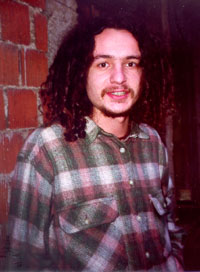 When late Yugoslav communist leader,
Josip Broz Tito, was on trial before the
court in old Yugoslav Kingdom in 1928, his words were: "I do not
recognize this court, I'd recognize only the trial by the party of my
commrades" - he meant his Communist Party, of course, but the famous
sentence (which we all learned in school many times) was essentially
emphasizing the right to fair trial - trial by the jury of ones peers,
which neither Tito then, nor Albin now were given.
When late Yugoslav communist leader,
Josip Broz Tito, was on trial before the
court in old Yugoslav Kingdom in 1928, his words were: "I do not
recognize this court, I'd recognize only the trial by the party of my
commrades" - he meant his Communist Party, of course, but the famous
sentence (which we all learned in school many times) was essentially
emphasizing the right to fair trial - trial by the jury of ones peers,
which neither Tito then, nor Albin now were given.
Like - here in the States, we're all bitching about how those cops who killed Diallo got acquitted by court in Albany - if the trial was in New York city, they might have been doing time right now. The situation in which New York city police officers, that killed a minority youth, are tried in the predominantly white and more conservative town is quite similar to Albanians being tried in Nis before all-Serb tribunals. If Kosovo is still nominally part of Yugoslavia, and if Serbs are guaranteed certain inalienable rights there, the Albanians on trial in Nis should be allowed fair trial by ethnically balanced jury, or the trials should be moved to Prishtina. Otherwise all those trials are just a mockery of the justice.
Albin, is, also, all right on speaking Albanian. Under the last Yugoslav Constitution, he has the right to be tried in his native language, and court should provide the interpreter at the court's expense. This right was previously used by four Slovenian journalists tried before the military court in 1988.
Kosovo student leader defies Serb court
NIS, Yugoslavia, March 9 (AFP) - A Kosovar student leader refused
to defend himself before a Serb court Thursday and accused Yugoslav
President Slobodan Milosevic's regime of "fascism" as his trial on
terrorism charges began.
As leader of the Kosovo Albanians Independent Student Union,
Albin
Kurti led street protests against Serbian rule in his home province in
1997 and 1998.
He was arrested by Serbian police during NATO's bombing
campaign
against Yugoslavia last year and if convicted faces up to 20 years in jail
for joining a "terrorist group," the term used in Belgrade for the
separatist guerrilla movement, the Kosovo Liberation Army (KLA).
Kurti, who worked as an assistant to KLA spokesman Adem
Demaci,
made a defiant statement as the trial opened in a courthouse in
Nis, but
refused to mount a defence or respond to prosecution questions, saying he
did not recognise the legitimacy of the court.
"This court has nothing to do with truth and justice, it serves the
policies of Milosevic's regime which has kept Kosovo under occupation," he
said.
"Our Union was against the Serbian regime, which, with its military
and police forces, has committed terror and systematic repression against
the Albanian people," Kurti said in Albanian, his words translated into
Serbian by an interpreter.
As Demaci's assistant, Kurti said he had tried "to present, as best
as possible, the KLA and its liberation war."
"The KLA liberation war is a justified struggle which has a holy goal
-- the independence of the republic of Kosovo and liberation of the
Albanian people from Milosevic's fascist regime," he said.
"I have no reason to defend myself or to respond to anyone and any
charges," Kurti said, adding that he would not answer any questions by the
prosecutor or judge.
At the end of his speech to the court, he said: "It is not
important for me whether you sentence me or for how long."
"Everything I did, I did voluntarily, with dignity and I am proud of
it and would do it again," Kurti said.
The trial, attended by the representatives of the UN Human Rights
office in Belgrade, Human Rights Watch and Belgrade non-government groups
Humanitarian Law Center and Committee of Jurists, is to resume on March
13.
Kurti is among some 1,300 Kosovo Albanians who are still being held
in Serbia on terrorism charges, according to the Humanitarian Law Center.
In December, ethnic Albanian human rights activist Flora Brovina was
sentenced to 12 years in prison for "terrorist activities" in a trial
condemned by the United States and international human rights groups.
More than 230 Albanians have been released since mid-June, when
Belgrade transferred roughly 2,050 prisoners from Kosovo when it was
forced by NATO air attacks to withdraw its forces from the southern
Serbian province, the centre said.
